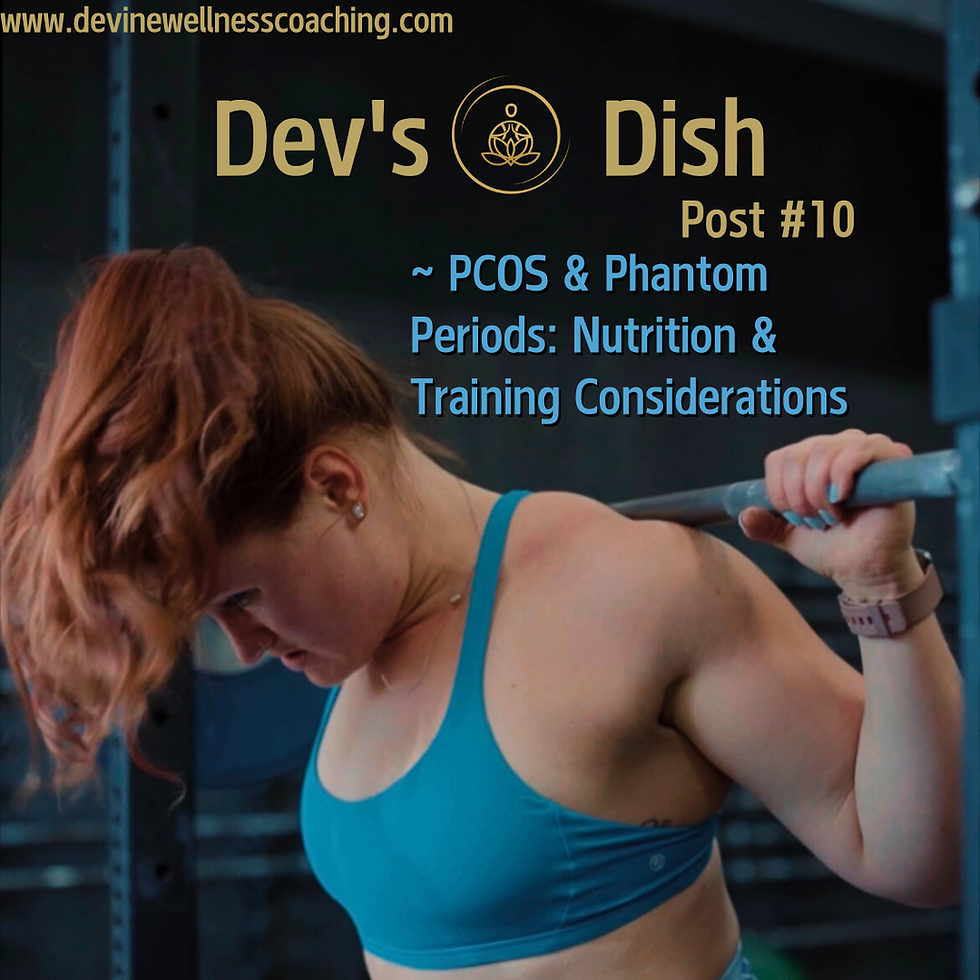PCOS & Phantom Periods: Nutrition & Training Considerations
- Devya Fluckiger
- Dec 9, 2024
- 3 min read

As a PCOSer, can you have a cycle without Aunt Flow coming to your doorstep?
In some ways, YES!
It is easy to overlook the effects of a period cycle when one lacks the “stain” to show for it.
That being said, there are absolutely nutritional and training considerations akin to non-PCOSer recommendations to incorporate into your lifestyle.
What is a Phantom Period?
A Phantom Period is pretty much what it sounds like. All the premenstrual symptoms without the bleed:
Cramping
Breast tenderness
Bloating
Irritability
Mood swings
Brain fog
Physical fatigue
Cravings
Digestion dysregulation
Joint / muscle aches and pains
Low back pain
Acne
Low libido
Energy crashes
Can a Phantom Period Affect my Training and Nutrition if I Don’t Bleed?
Yes. Even if you do not have the ability to generate a sufficient endometrial lining to shed during a period you may still:
Produce eggs
Release eggs
Form a corpus luteum (varies)
Have fluctuations of estrogen and progesterone, LH, FSH, and cortisol throughout the month.
Due to the above factors, this means your sleep quality, mood, blood sugar regulation, stress management, performance and recovery will fluctuate throughout the month. As a result - it would bode well to tune into your body’s symptoms throughout the month when making informed decisions about your training and nutrition.
Nutrition, Training & Lifestyle Considerations:
When you notice the aforementioned premenstrual symptoms, keep a symptom log. Use an app like a period tracker or health app to note when you are having any of the above listed symptoms. This will help you make healthful choices and ballpark symptom occurrences and regularity.
Be diligent with sleep. Try to get an extra hour per night.
Cycle your training and rest days. Take it day by day. If you feel fine, train like normal!! If you have the all-too-familiar “weak to the bone” feeling, perhaps select a less intense training session or take an extra rest day. This does not mean that you have to be couch-bound all day. Try to go for a nice walk in the sun and get Nature’s dose of Vitamin D and Melatonin!
Keep glucose levels stable:
Have an extra serving of protein and fiber (a hunk of meat and veggies never hurt). For example if you usually have 150 grams of protein a day - perhaps bump it up to 175 grams.
No naked carbs!! Dress them up with protein, fiber and a bit of fats.
Do NOT skip meals during the busy work day. Dips in glucose combined with sharp spikes are an accomplice to the “munchies” along with monthly estrogen fluctuations eliciting the same. This is what tends to have you raiding the pantry late at night in a blind hangry rage.
Hydrate!!! Half your body weight in ounces of water plus 500mL per hour of physical activity!
Avoid alcohol. Aside from its effects on dehydration, it also increases the unwanted spikes in blood sugar, ergo more “good ‘ol period munchies”.
Potassium intake: 2300-2600 mg a day for women. This can be found in dried fruit, bananas, potatoes, coconut water, meat, fish and poultry. (If you track your food intake on a tracking app - your daily totals will show in the daily summary!)
Get your ass outside.
Additional Considerations
Ensure that you are spending at least 6 months a year in maintenance calories or in a muscle building phase. Regular intake of food that meets your body’s caloric demands will aid in giving your body the best chance at calibrating the hormonal clock to spin at somewhat regular cyclical intervals.
Supplements to consider and run by a functional provider:
Magnesium Glycinate to support mood regulation and aid in relief of bowel inflammation
Vitamin B 12 and 6 supplementation to support dysregulation of estrogen and progesterone.
NAC to reduce oxidative stress.
Ashwagandha to aid in cortisol dysregulation.
Nootropics.
Closing Thoughts
As a PCOSer myself, I have been fed up with having premenstrual symptoms with no flow to follow it. By tuning into my body and understanding how my cycle looks for ME, I feel more in control of my nutrition and lifestyle in getting the results I seek.
Don’t let your PCOS take over your quality of life.
You’re in the driver's seat of your body. Your behaviours spin the clock of your cycle. Take the damn wheel would ya?
If you need a lifestyle navigator, my door is open for consults.
DISCLAIMER:
This article does not serve as medical advice.
References:




Comments